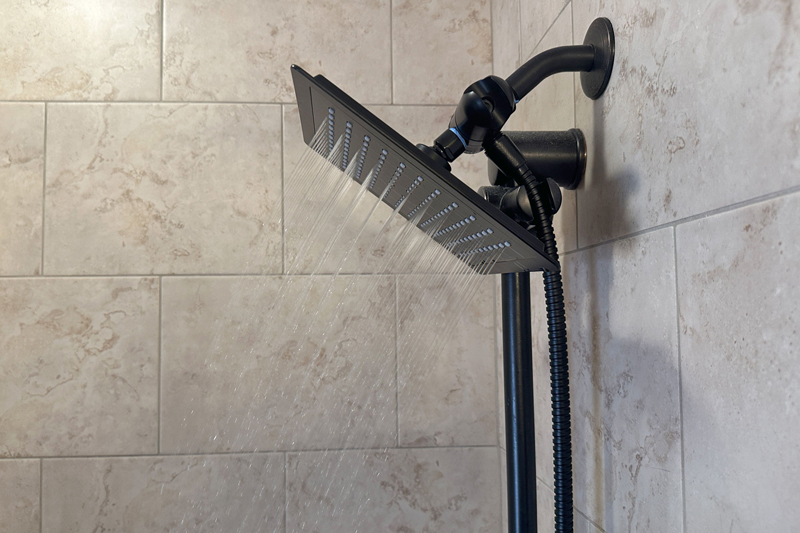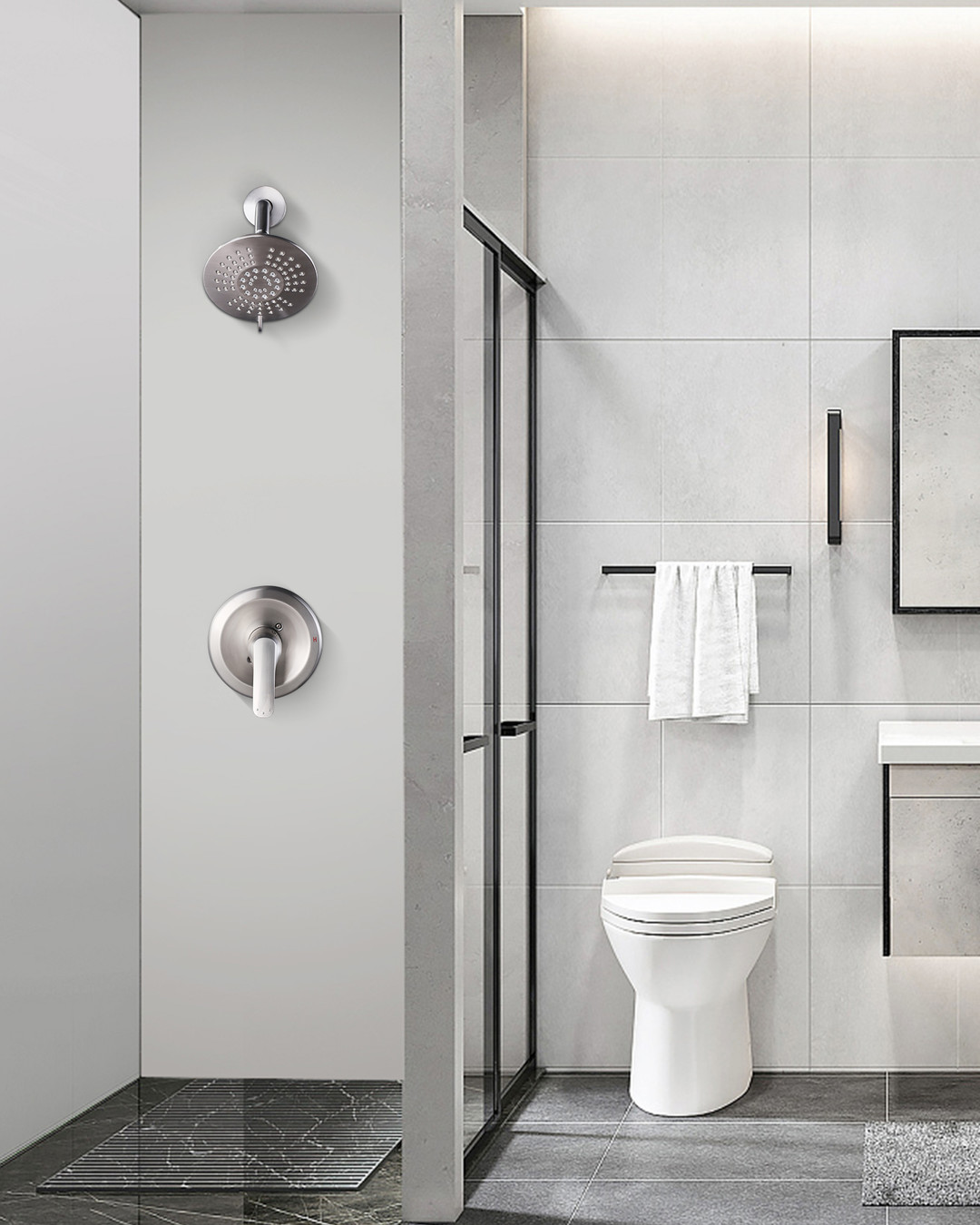Are Rain Showers Really Worth the Investment? Pros, Cons, and Everything In Between
View Count:9 CategoryBlog
When it comes to creating a luxurious bathroom experience, few fixtures can rival the elegance and indulgence of a rain shower. With their wide, gentle flow of water mimicking the sensation of standing in a warm rainfall, rain showers are often considered a staple in high-end bathrooms. But with their sleek design and premium price tag, are rain showers really worth the investment? Let’s break down the pros and cons to help you determine whether a rain shower is right for your bathroom.
The Appeal of a Rain Shower
A rain shower’s primary allure is the experience it provides. Unlike traditional showerheads, which tend to concentrate water in a single stream, rain showerheads distribute water across a large surface area, offering a softer, more enveloping experience. For many, it’s about more than just getting clean—it’s about creating a soothing, spa-like atmosphere that makes showering feel like a ritual.
Here are some of the key advantages of rain showers:
1. Luxurious Shower Experience
The most obvious appeal of a rain shower is the sheer luxury it provides. The wide spray pattern and gentle flow of water create an immersive, relaxing experience that simulates the feeling of standing in a gentle rainstorm. This calming effect can help melt away stress after a long day, making it more than just a functional part of the bathroom, but a sanctuary for self-care.
The sensation of rainwater falling gently on your body is different from traditional showers, which tend to be more direct. For those who prioritize relaxation, a rain shower offers a way to elevate the everyday routine of showering into an indulgent experience.
2. Sleek, Modern Design
Rain showerheads have a sophisticated, modern look that can instantly elevate the aesthetic of your bathroom. Whether you opt for a ceiling-mounted rain shower or a wall-mounted version, they offer a clean and contemporary appearance that fits well in upscale bathrooms. Ceiling-mounted models, in particular, give the bathroom an elegant, high-end feel and are a hallmark of many luxury hotel suites and spas.
If you’re remodeling your bathroom or building a new one, a rain shower can add significant visual appeal and boost your home’s overall value. They give the room a minimalist, almost art-like appearance, contributing to a calming, organized atmosphere.
3. Even Water Distribution
The design of a rain shower ensures that water is distributed evenly across the body, unlike traditional showerheads, which can focus water on specific areas. The result is a more uniform, comfortable shower experience that covers the entire body without the need for constant adjustment.
Many rain showerheads are designed to be adjustable, allowing you to tweak the flow of water to your liking. While they don’t offer the same precision as handheld or fixed showerheads, they are perfect for those who enjoy a gentle, all-over flow of water.
4. Better for Longer Showers
If you’re someone who enjoys longer showers, a rain shower can be an excellent choice. The gentler water pressure and wider distribution make it ideal for extended bathing sessions without feeling too intense. The calming nature of a rain shower encourages relaxation, making it easier to spend more time unwinding under the water.
Unlike a traditional showerhead, which might feel too powerful or uncomfortable for some during long showers, rain showers create a soothing atmosphere that encourages you to linger and enjoy the experience.
5. Can Help with Humidity and Air Circulation
Some rain showerheads, especially ceiling-mounted models, can enhance the humidity levels in a bathroom, which is beneficial for your skin and hair. The even distribution of water creates a steamier environment that can help hydrate your skin, prevent dryness, and open up pores. Plus, the water’s gentle fall can help circulate air in the room, preventing the buildup of steam and moisture in a concentrated area.
The Drawbacks of Rain Showers
Despite their many benefits, rain showers are not without their disadvantages. There are several factors to consider before deciding if they are truly worth it for your home:
1. Water Pressure Concerns
One of the most common complaints about rain showers is the issue of water pressure. While the wide spray of a rain shower can create a calming experience, it may not deliver the intense, high-pressure flow that many people prefer for an invigorating shower.
In traditional showers, the water pressure is focused on a small area, providing a stronger and more concentrated flow. With a rain shower, the pressure is spread over a larger surface, which can lead to a gentler, less forceful shower. If you’re someone who values a powerful stream to help you rinse off quickly, a rain shower may not meet your expectations.
For this reason, rain showers are often best suited for those who are looking for a gentle shower experience rather than a quick, efficient one.
2. Water Consumption
Rain showers can also consume a significant amount of water, particularly if the showerhead is large and the water flow is set at a high volume. While this may not be an issue for everyone, it’s worth considering the environmental impact and your water bill. The average rain showerhead can use anywhere from 2.5 to 5 gallons of water per minute, which can add up over time, especially if you enjoy long showers.
If you’re concerned about water conservation, there are water-efficient rain showerheads available that can help mitigate this issue. These models are designed to reduce water usage while still providing the rain-like experience, but they may not be as powerful as traditional models.
3. Installation Complexity
Depending on the style of rain shower you choose, installation can be more complicated than a standard showerhead. Ceiling-mounted rain showers, for example, require careful planning to ensure proper water flow and ceiling support. It’s often necessary to have a plumber install these types of systems to ensure that everything is correctly connected, which can add to the cost.
Additionally, if your bathroom isn’t already set up to accommodate a rain shower, you may need to make significant renovations, such as adjusting the plumbing or adding additional support for the showerhead. This can increase the overall cost of installation, making the investment even more expensive.
4. Maintenance
Rain showerheads, especially larger models, may require more maintenance than traditional showerheads. The wide spray can sometimes result in mineral buildup, which can block the holes in the showerhead and reduce water flow over time. This can lead to uneven water distribution or a less effective shower experience.
Regular cleaning and maintenance are important to keep your rain shower functioning properly. If you live in an area with hard water, it’s especially important to clean your rain showerhead regularly to prevent mineral deposits from accumulating.
Conclusion: Are Rain Showers Worth It?
Ultimately, whether a rain shower is worth it depends on your priorities and preferences. If you value a luxurious, spa-like shower experience and are willing to invest in a higher-end fixture, a rain shower can be an excellent addition to your bathroom. The soothing, enveloping water flow and modern aesthetic can elevate the ambiance of your space and turn an ordinary shower into a relaxing retreat.
However, if you’re more focused on water pressure, efficiency, or water conservation, you might find that a traditional showerhead better suits your needs. Rain showers are best for those who prioritize relaxation and design over quick and efficient showers. In the end, it all comes down to what you’re looking for in your daily shower experience and how much you’re willing to invest in creating that perfect atmosphere.
 Faucet Online
Faucet Online



您好!Sign In